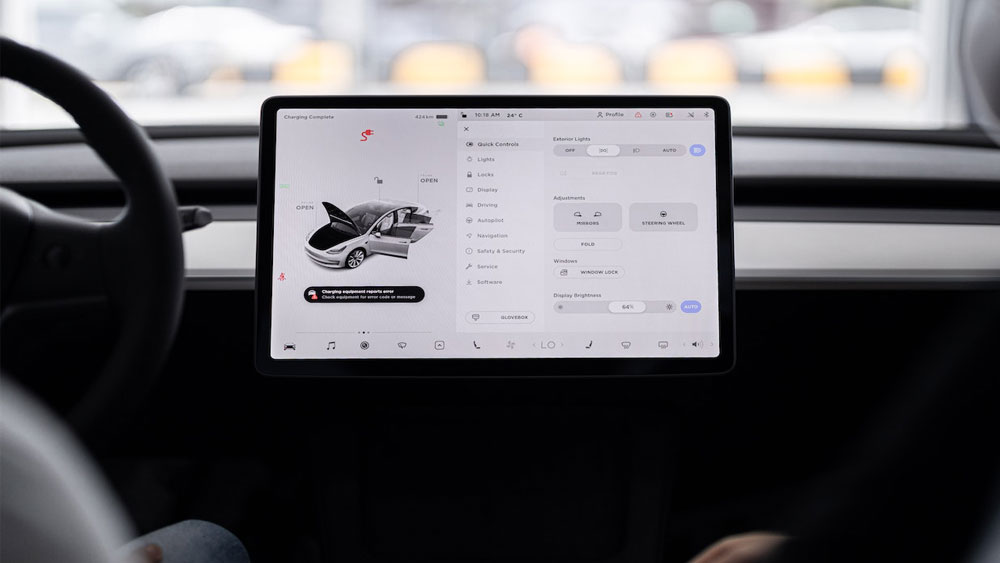Top Picks for the Best Self-Driving Cars in 2025: Driving into the Future

Now with the advancement of Technology and Artificial intelligence (AI). AI has been improving the lifestyle of people & taking over the work burden from humans. Driving a car was also hectic and demanding for extended adventures.
To tackle these concerns, companies have employed cutting-edge technologies like neural networks, machine learning, artificial intelligence, and deep learning algorithms in combination with sensors and cameras. This integration allows for reduced driver interaction and enables cars to operate independently.
Referred to as self-driving or autonomous cars, the concept of such vehicles may appear contemporary; however, it has actually been in existence for nearly a century. In 1920, the engineer, “Francis Hudina,” invented an electric car, which he was able to control remotely. However, the project failed because he lost control of the car multiple times.
Despite this setback, self-driving cars have since made remarkable progress in terms of safety and reliability, revolutionizing the entire automobile industry by significantly reducing the risk of accidents. A research from McKinsey & Company says self-driving cars and driver-assist tech might bring $300 to $400 billion to the car market worldwide by 2035. That shows these cars are a big deal for both tech and money.
In this narrative, allow me to guide you through the advantages offered by self-driving cars, introduce you to their leading manufacturers, and highlight some of the best autonomous vehicles available today.
The History of Self-driving Cars and the Hard Work of Stakeholders
Most people have this misconception that Google or Tesla laid the foundation of driverless cars. The idea of self-driving cars was first envisioned by General Motors during the Futurama exhibit at the 1939 New York World’s Fair. Two decades later, GM tested a Chevrolet equipped with ‘pickup coils’, which was capable of steering itself without human intervention. In 1977, S. Tsugawa along with his associates at Japan’s Tsukuba Mechanical Engineering Laboratory unveiled a vehicle, which could be termed as the first autonomous car. It featured two cameras which made use of analog computer technology and could process images of the road ahead. Later, a German aerospace engineer, Ernst Dickmanns worked hard on this technology and got famous as “the pioneer of the autonomous car” owing to the numerous projects he introduced in 1980s.
Fast forward to the 21st century and you see not only automakers but also the tech giants working to make fully self-driving cars a reality. Who’s working to realize this dream? You would be surprised to see a few names in the list which includes Google, Uber, China’s Baidu, Tesla, GM, Daimler, Volvo, Ford, Jaguar Land Rover, Audi, BMW, Toyota, Mercedes-benz etc, are developing solutions and most of them are even test driving their autonomous cars in different parts of the world including US, UK and China.
Best Self-Driving Car Companies
Let’s look at the companies offering the best self-driving cars, contributing to the revolutions of the automobile industry, and innovating the driving experience.
1. Waymo

Waymo is one of the first companies that started autonomous vehicles, and they are a subsidiary of Alphabet Inc. which is Google’s parent company. With this innovation, they have conducted extensive testing and research on the cars. As a result, they have manufactured some of the advanced vehicles and taxis without very exceptional drivers.
2. Tesla
With it comes to electric cars, the first person that comes to mind is Elon Musk, who founded the Tesla company. Tesla’s work in manufacturing electric vehicles needs no introduction. The autopilot feature in these cars contributes to the best self-driving cars. Tesla’s distinctive design, color and frequent software updates have enlightened a strong brand appeal.
3. Cruise
Cruise is another autonomous car manufacturer nourishing and putting a lot of effort into innovating in the car industry. The cruise company was 2013, and they are a part of General Motors. Their driverless taxis are prevalent as they have put a lot of emphasis on safety and sustainability.
4. Mercedes Benz Group

We have all heard about the luxurious and most splendid supercars by the Mercedes company. Now they are making their mark in self-driving cars as well. They have deep learning and artificial intelligence expertise and provide the most effective sensors and perception modeling. Their S-class cars showcase both innovation and luxury at the same time.
5. Uber:

Uber, a globally recognized ride-hailing service, has recently entered the realm of self-driving car services. Their ambitious goal is to revolutionize urban transportation. By forging partnerships with established autonomous technology companies like Waymo, Uber strategically taps into their experience.
The company is determined to provide autonomous ride-sharing services, which will revolutionize the way people commute in urban environments. Uber’s investments in self-driving technology are positioned to play a crucial role in shaping the future of urban mobility.
6. Apple Autonomous:
Apple, the tech giant, officially started its self-driving car project in 2014. After two years, the company scaled back its full-car ambitions and turned its focus to create self-driving software instead of building a whole vehicle. In 2017, Apple started road testing by retrofitting SUVs with autonomous tech, under a California DMV permit. In January 2024, reports suggested Apple watered down its ambitions. The tech company moved from fully autonomous to Level 2+ driver-assist systems, and delayed any release to 2028 or later. In February 2024, Apple officially canceled Project Titan, and shifted its resources to generative AI and related initiatives.
7. Amazon Autonomous:
E-commerce titan Amazon has ventured into self-driving technology to enhance its logistics and delivery operations. Amazon’s investment in autonomous vehicles signifies the growing importance of efficient and reliable autonomous delivery services. The company’s focus on automation in transportation highlights the potential for self-driving technology to reshape last-mile logistics and create more sustainable delivery systems.
Best Self-Driving Cars in 2025
As the automotive industry continues to pivot toward electric and autonomous vehicles, here are the top self-driving cars to consider in 2025, each offering a unique blend of innovation, safety, and performance:
1. Tesla Model S:
The Model S is equipped with state-of-the-art hardware and software, including Tesla’s advanced Autopilot system. This combination offers an unparalleled autonomous driving experience. Not only does it provide autonomy, but it is also environmentally friendly, with impressive range variants offering up to 402 miles on a single charge. Additionally, its spacious interior and innovative touchscreen controls, complemented by its sleek design, firmly establish the Model S as a standout in the luxury electric vehicle market.
2. Nissan Leaf:
The Nissan Leaf combines affordability with semi-autonomous capabilities, thanks to its Pro-Pilot option. The Leaf’s battery-electric powertrain guarantees emission-free driving, making a positive contribution to the environment. Its appealing design and practicality make it an ideal option for individuals in search of an environmentally conscious and budget-friendly self-driving car. The Leaf S with a 40.0-kWh battery pack delivers just 149 miles of range. The SV Plus with 212 miles of range is a better option for people who have to commute longer distances.
3. Tesla Model 3:
Tesla’s Model 3 serves as an accessible entryway into the realm of self-driving vehicles, ensuring both safety and high performance without compromise. Its impressive range, efficient electric powertrain, and Tesla’s Autopilot technology make it a compelling option for those seeking semi-autonomous capabilities without breaking the bank. The Model 3’s minimalist interior and responsive handling further enhance the driving experience. The Long Range RWD model is good for 363 miles range. The Long Range AWD is a little less efficient in terms of mileage with 346 miles of driving range.
4. Waymo One:
Waymo One, part of Alphabet Inc., offers an extensive ride-hailing service featuring fully autonomous vehicles. Passengers can enjoy a hands-free journey while Waymo’s cutting-edge technology handles every aspect of driving. Waymo’s commitment to safety and rigorous testing makes it a trusted choice for those looking to experience fully autonomous transportation. The main vehicle used by Waymo currently is the Jaguar I-PACE. This all-electric SUV using a 90 kWh battery delivers an EPA-rated range of approximately 234 miles per charge.
5. BMW 7 Series:
BMW’s 7 Series combines luxury and cutting-edge autonomous features, showcasing the brand’s utmost dedication to self-driving innovation. The vehicle boasts an array of advanced driver-assistance systems, including adaptive cruise control, lane-keeping assistance, and a diverse range of semi-autonomous driving modes. Step inside the plush and technologically sophisticated cabin of the 7 Series which caters perfectly to those who value both comfort and unrivaled performance. The i7 eDrive50 has an estimated electric range of 301–314 miles. Other electric models are somewhat less efficient. On the other hand, the 750e xDrive plug-in hybrid delivers over 35 miles of pure electric range.
6. Audi A8:
The Audi A8 provides a hands-free driving experience in specific traffic conditions, thanks to its AI Traffic Jam pilot. Radar and sensor technology work in tandem to offer a seamless semi-autonomous experience, making highway cruising more convenient. Audi’s commitment to luxury and innovative technology is evident in the A8’s design and features. The 2025 Audi A8 (likely the 55 TFSI mild-hybrid AWD version) achieves an EPA-rated 22 MPG combined (20 MPG city, 26 MPG highway), as per Edmunds. The overall estimated driving range is around 477 miles, according to Motortrend.
7. Volvo XC90:
Volvo’s XC90 incorporates the Pilot Assist system, offering a taste of autonomous driving with adaptive cruise control and lane-keeping assistance. Its focus on safety is a hallmark of the brand, making the XC90 a family-friendly choice. The XC90’s elegant Scandinavian design and spacious interior add to its appeal.
The mild-hybrid B5 and B6 trims of the XC90 deliver a gas-only range around 400–480 miles, depending on your driving. On the other hand, the T8 plug-in hybrid gives you about 32 miles of quiet, emission-free driving, followed by gas/hybrid mode at roughly 27 MPG combined after the battery is drained.
8. Ford Mustang Mach-E:
Ford’s entry into the electric SUV market, the Mustang Mach-E, offers captivating driver assistance features, including a comprehensive semi-autonomous driving package. This electric SUV combines Mustang-inspired design with practicality, catering to those seeking a mix of performance and sustainability. The Mach-E’s roomy interior and impressive tech features make it a versatile option.
The 2025 Mustang Mach-E can cover about 240–260 miles on a standard-range pack, depending if you are driving RWD or AWD. The extended-range battery with RWD offer the highest range of roughly 300–320 miles. The GT and Rally performance editions offer range in the 265–280 mile ballpark due to their dual-motor layouts.
9. Mercedes-Benz S-Class:
The Mercedes-Benz S-Class offers a seamless blend of luxury and cutting-edge self-driving technology. It boasts advanced features like distance assist and active steering, providing an elevated driving experience. Its opulent interior, cutting-edge technology, and refined driving experience make it a statement of elegance and innovation. The S-Class is ideal for those who prioritize comfort and innovation in their autonomous driving experience.
The 2025 S-Class plug-in hybrid (S 580e) can cover around 50 miles on electric power alone before the gasoline engine kicks in. Alternatively, the pure gasoline variants like the S 580 deliver an estimated driving range of around 400 miles per full tank, based on fuel economy and tank size.
10. Google Autonomous Car:
Google’s self-driving car project, now part of Waymo, is continuously advancing in autonomous technology. They are dedicated to creating innovative and safe vehicles, prioritizing cutting-edge features. Waymo’s strong focus on data-driven decision-making and rigorous testing guarantees a high level of safety and reliability. While the specifics of their vehicle offerings may evolve, Google’s commitment to autonomous technology remains unwavering.
11. Hyundai Autonomous Vehicles:
Hyundai has joined the autonomous vehicle market, emphasizing advanced driver-assistance systems and envisioning a future of self-driving transportation. Their vehicles integrate cutting-edge sensors and AI technology, delivering a dependable and efficient autonomous driving experience. Hyundai’s commitment to quality and affordability shines through in their autonomous offerings, attracting a diverse range of consumers.
Hyundai has developed fully electric, SAE Level 4 robotaxis based on the Hyundai Ioniq 5 EV, and has also tested it in places like Las Vegas.
The South Korean automaker has also partnered with Waymo to add Waymo’s sixth-generation autonomous system (“Waymo Driver”) into Ioniq 5s, meant for final addition in the Waymo One fleet.
The 2025 Ioniq 5 with 63 kW battery delivers 245 miles of range. The long range battery gives the most bang for the bucks in terms of mileage (~318 miles). The dual motor AWD variants offer a maximum of ~ 290 miles.
12. Cadillac Escalade:
The Escalade stands out as a premier option for those seeking a spacious and opulent SUV thanks to impressive engine power and advanced technological features. It offers attractive entertainment options and generous seating across all three rows. You’ll find the Super Cruise system as an option for the Escalade. GM Super Cruise enables hands-free driving on compatible roads.
Equipped with an in-cabin camera, this Cadillac observes the driver. Super Cruise activation relies on the driver-monitoring system confirming your attention to the road. The Premium Luxury represents the most budget-friendly trim featuring Super Cruise capability. Opting for the Super Cruise package increases the price of this trim by $2,500.
The gas-powered 2025 Escalade delivers roughly 335–430 miles per fill-up, depending on driving conditions. Conversely, the all-electric Escalade IQ may have an estimated range of around 460 miles, and real-world testing (by Edmunds) even shows up to 558 miles, which makes it one of the longest-range electric SUVs available today.
13. Lincoln Corsair 2024:
Lincoln has really stepped up in the luxury game, offering an impressive hands-free driving system. Now, here’s the fun part—this tech is actually shared with Ford. So, depending on where you’re looking, you might see it referred to as ActiveGlide, which used to be Lincoln’s name for the system. But they’re phasing that out and rolling with Ford’s BlueCruise instead.
Whatever name it goes by, the important thing is the experience. You get access to some pretty sophisticated tech that allows for hands-free driving—imagine cruising effortlessly for a short stretch without touching the wheel. How cool is that?
Take the Corsair, Lincoln’s sleek compact crossover. BlueCruise is available across the lineup, but if you’re eyeing the base Premiere trim, you’ll need to opt for the Collection II package ($3,595) or go all out with Collection III ($11,030) to unlock it. And, before you wonder if it works everywhere, it’s compatible with pre-mapped sections of road, called Hands-Free Blue Zones. That’s over 130,000 miles of North American highways where you can sit back and let the car take over, at least for a bit.
The 2025 Lincoln Corsair gives you around 405 miles total range per tank, with 356 miles city and 486 miles highway estimates. The Corsair Grand Touring plug-in hybrid offers up to 28 miles of electric-only driving, then switches into efficient gasoline hybrid mode at about 33 mpg.
Benefits of Autonomous Cars
Self-driving cars can perform driving tasks without the control of humans. Let’s explore some of the advantages of these cars:
- Such cars are equipped with sensors and AI algorithms that are very fast and responsive. Engineers have been working on machines that give output simultaneously. Best self-driving cars detect and respond to potential hazards more effectively than human drives, reducing the risk of injuries. They are safe and reliable cars.
- Since these cars are self-driven, it removes the traffic tension from an individual. These cars can move on their own and create a synchronized flow of traffic that results in smooth traffic patterns.
- These cars are highly inclusive and provide mobility to people with disability. Such cars follow the standards set by the ADA ( Americans with Disabilities Act), which makes transportation accessible for all members.
- These cars have also been shown to be very efficient on fuel other than traditional cars. With that, autonomous vehicles give a very economical, affordable, and enhancing driving experience.
- Besides providing a comfortable environment, AVs allow you to utilize your travel time. You can attend meetings, read, or work while your car is self-driven.
- These cars are not as fast as supercars. However, they are designed to optimize driving patterns and lower emissions that, contribute to the sustainability of the environment.
Conclusion:
Self-driving cars have revolutionized the automotive industry and our whole perception of driving. In addition, these vehicles are poised to bring about a remarkable transformation in the realm of smart transportation, optimizing its efficiency and reliability.
Many prominent companies are working and trying to provide the perfect and completely autonomous car. Top manufacturers such as Waymo, Tesla, Cruise, Mercedes Benz, and Uber provide a variety of impressive AVs that are both unique and innovative. So what’s stopping you? Invest in the best self-driving car for a convenient driving experience and environmental sustainability.

news via inbox
Sign up and never miss out on the latest news and updates at HighStuff



